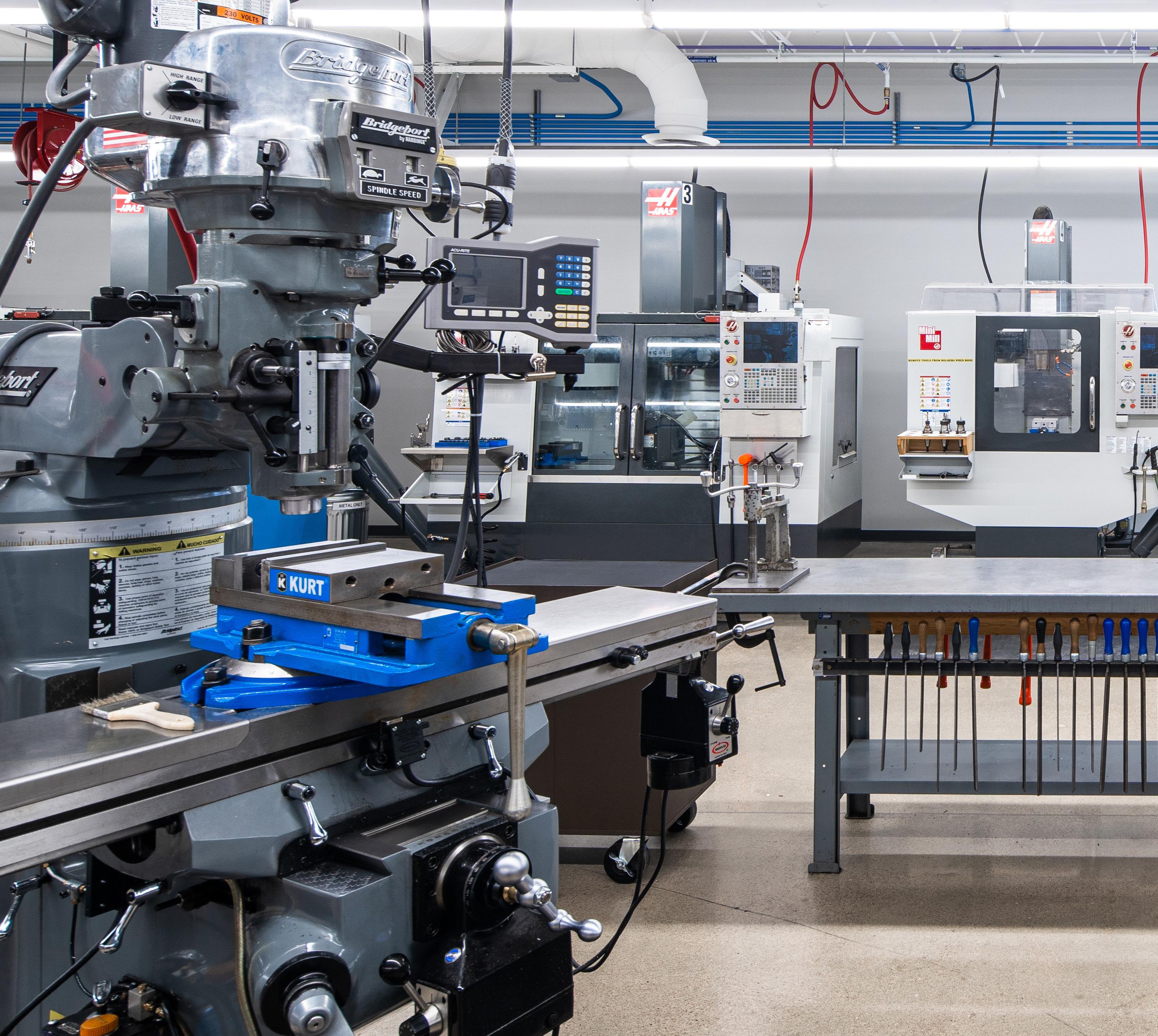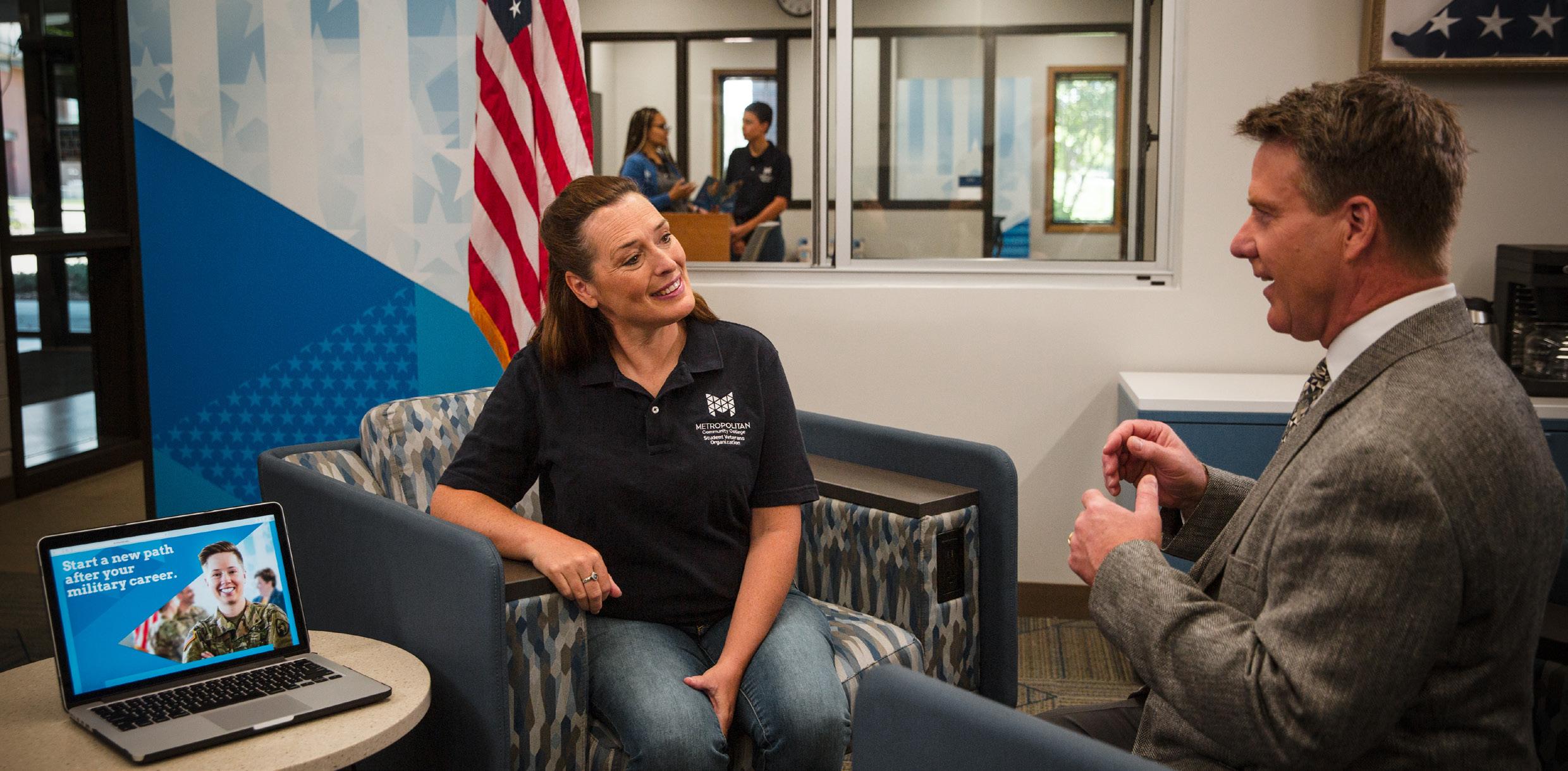
8 minute read
A reason for celebration: Renovation to help meet workforce demands


Over the past decade, Metropolitan Community College has seen its fair share of growth, both from a program standpoint and from a square footage standpoint. Those expansions usually come with a celebration, a time when MCC students, faculty and staff can celebrate the completion of a game-changing addition. Unfortunately, with the COVID-19 pandemic, such a celebration was not possible with the completion of the Center for Advanced Manufacturing.

But the real celebration is taking place behind closed doors, in the classrooms. Students are learning the skills they need to complete their education and earn a job in a high-demand career, in part thanks to generous donors, industry partners and community members who played a role in the renovation project. The new Center for Advanced Manufacturing is the result of a $10.5 million dollar renovation of the old Industrial Training Center on the South Omaha Campus. The nearly 30,000-square-foot facility includes new space for programs such as Drafting and Design, Industrial and Commercial Trades, Precision Machine Technology, Process Operations Technology and Welding Technology, while creating new degree options in the manufacturing field.
The decision to renovate the Industrial Training Center wasn’t made just because the paint was getting old. Much of the current manufacturing workforce is reaching retirement age, leaving jobs unfilled, but opportunities created. MCC wanted to meet the needs of the local workforce by creating more space for prospective employees to learn the newest skills.


“The Center for Advanced Manufacturing is the College’s response to Nebraska’s growing manufacturing workforce needs,” says Randy Schmailzl, MCC president. “The Nebraska Department of Economic Development expects the number of manufacturing jobs to grow in the coming years. Local businesses are going to need skilled prospects to fill those positions. The curriculum at MCC will prepare students for fulfilling careers in advanced manufacturing, while helping local businesses compete.”
There’s a high demand for trades professionals with a two-year degree or certification. These skilled workers will be the ones to fill those gaps left by retirees. The Nebraska Department of Economic Development anticipates a 7.1 percent increase in manufacturing jobs by 2025. MCC is meeting with industry partners in advisory council settings, learning what local businesses are looking for. The College is also engaging with industry partners by providing certification training for currently employed individuals who may need to upskill in certain areas.
“Industry partners love the ease with which they can send employees to MCC for training. Having multiple programs that are related to each other in the same building allows for collaboration between programs and gives industry partners opportunities,” says Jim Champion, MCC Pathway facilitator. “From entry level employees that are just starting out, to experienced technicians that are looking to go to the next level, the College is a great choice for businesses in an ever-changing technical training world.”
Champion says that students in trades classes will quickly discover that there is a connection between all of the different programs at the Center for Advanced Manufacturing.
“Having experienced instructors, new labs and student support all located in the same academic building will enhance the student’s overall experience and give them the best chance at retention and success,” explains Champion.
Also included in the redevelopment is a brand new Veterans and Military Resource Center, located near the entrance of the Center for Advanced Manufacturing. Previously located in the Connector Building at the South Omaha Campus, the new center provides more personal touch in a quieter environment.
“The new veterans center provides a place to meet likeminded veterans at MCC since we don’t normally blurt out that we’re veterans during class,” says Kevin Littleman, retired senior master sergeant and current MCC Nursing student. “A place like this is going to make it easier to connect with other veterans and active duty.”
Littleman also says the creation of the Veterans and Military Resource Center is a very welcomed gesture by the College.
“It’s a nice ‘thank you’ from the school, acknowledging that we are a significant subset of the student body,” explains Littleman. “It gives us a place to meet, decompress, study and re-energize. The College is helping us transition from a totally different subculture of military service by allowing us to come in between classes to a place where the energy is a little different, letting us swap stories, commiserate a little even, then jump back into the day refreshed for the next class.”
Unfortunately, that in-person part will have to wait a little while. Currently, the center is closed for in-person activities due to the ongoing COVID-19 pandemic. But Military and Veterans Services staff is offering online counseling and other remote services.
“The center serves as the first point of contact to advocate and guide our veterans, service members and their families along their educational journey. We achieve this, in part, by providing information about various courses, military and community resources and by offering assistance where we can,” says Daniel Mohr, director of the Veterans and Military Resource Center. “To keep the focus on veterans, the center has partnered with various state and local resources allowing outside representatives to meet with students, either in-person when conditions allow for it, or remotely.” Many Omaha area veterans and active duty members choose MCC because of its affordability, flexibility, transferability and credit given for military service. This is evident through Littleman’s story. Littleman, who aspires to join the nursing profession and work in emergency care, also recommended the College to his son Christian, a U.S. Air Force veteran like his father. Littleman also had experience in the military that he felt would not transfer to civilian life. His experience, however, did transfer to MCC to use as credit toward a degree.

“I was a scientific applications specialist in the Air Force, meaning we were the guys using satellites, hydro acoustics, planes and seismometers to detect potential nuclear explosions on Earth. Obviously, there is not a need for nuke hunters in civilian life,” quips Littleman. “My post-graduation goal is to work in emergency care or an ICU, where the pace is brisk and stakes can be high. I like to meet people when they are in need. I want to make a significant impact in their life so they can recover and be ready to continue on with their life.”
The Center for Advanced Manufacturing is just one phase of the South Omaha Campus project. The other phase includes the creation of the Automotive Training Center, a two-story academic building that will bring Automotive Technology and Auto Collision Technology together under one roof. The building, located on Edward Babe Gomez Avenue, is scheduled to be completed in 2021.
LinkedIn Series Get the most out of your LinkedIn profile with three noncredit classes.

• Leverage your LinkedIn profile: Jan. 13 • Optimize your LinkedIn network: Jan. 20 • Maximize career opportunities using LinkedIn: Jan. 27
All classes are offered via Zoom. For more information or to register, visit mccneb.edu/ce.

A black-belt résumé the Six Sigma way

New training academy gives professionals a ‘proving ground’
Company A is hiring for a new operations manager. You want the job and have the experience. When Company A doesn’t call you for an interview, you’re left wondering “why?”
“There are certain things on résumés that companies look for. Often, it’s things such as continuing education classes or extra credentials someone has obtained over their career that sets them apart,” says Robert Caldwell, Metropolitan Community College workforce training manager. In this case, Company A might just be looking for a Lean Six Sigma credential.”
MCC launched the Lean Six Sigma Academy earlier this fall, giving area professionals another option to develop those needed skills in a part-time training format. Lean Six Sigma is a methodology designed to improve efficiency, eliminate waste, mitigate quality issues and improve working conditions to provide a better response to customers’ needs.
“This academy is a great way to boost your résumé quickly without going through years of extra schooling,” says Caldwell. “Though it’s offered in a convenient format, Lean Six Sigma is no walk in the park. It gives students valuable training in a setting outside of their traditional job. A proving ground of sorts. When companies see Lean Six Sigma training on your résumé, they’re going to be impressed.” a blended-learning format, a mix of in-person instruction and online coursework. The combination of Lean Six Sigma tools, methods and principles creates a methodology for improving an organization’s operations, mindset and culture. The academy courses emphasize interactive simulations, small group interaction and real-world projects. Upon completion of the capstone project, participants can earn a MCC Lean Six Sigma certificate and an American Society of Quality (ASQ®) certificate that are recognized and sought after in business and industries such as manufacturing, healthcare, transportation and more.
“A Lean Six Sigma credential validates that an individual understands how to apply a set a tools and techniques to help improve processes within an organization,” explains Caldwell. “This is a valuable skill-set to many employers as it demonstrates a job candidate has the ability to identify errors, identify opportunities for improvement and eliminate waste.”
At MCC, the yellow belt certification takes approximately six weeks to complete. To achieve a green belt certification, candidates must have earned a yellow belt, plus an additional three months of training to complete. A black belt certification could take six months or longer to complete, in addition to earning green and yellow belt certifications.




